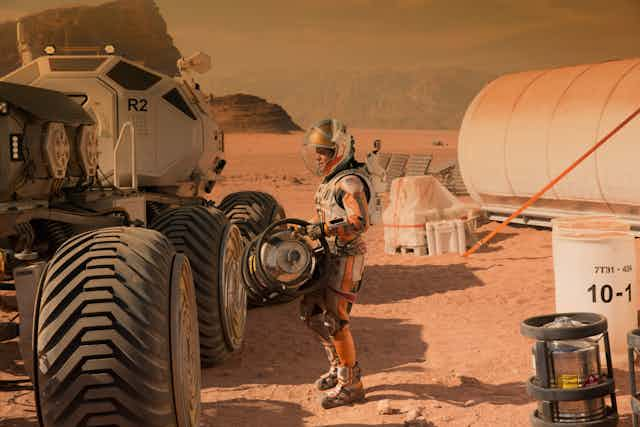The penultimate object in the spectacular Cosmonauts exhibition, just opened at the Science Museum in London, is a spacesuit for a mission to Mars. It is lightweight, almost fragile and the pink-brown colour of the Martian sky. It suggests that after the fraught Cold War dynamics of the old space race, the inevitable next destination is the red planet.
Folks at NASA will be cheering Ridley Scott’s new film, The Martian, because its central message is that humanity will take this second giant leap, and, individually and collectively, we have the ingenuity to overcome the immense risks entailed. Inspirationally, it answers the question of how the voyage will be made, but it also begs the deeper question of why.

The story (trying to avoid major spoilers) is simple: astronaut Mark Watney (Matt Damon) is left behind when a sudden storm forces the abandonment of a scientific expedition to Mars. Unexpectedly alive, Watney has to improvise the means of survival until a rescue mission arrives.
The Martian is the latest, and I think brightest, of a meteor shower of recent space films, including the Oscar-winning Gravity, the black hole time travel yarn, Interstellar, the fun Guardians of the Galaxy and lesser blockbusters, such as Oblivion (with Tom Cruise) and Scott’s own Prometheus. We are in the midst of another wave of sci-fi movie enthusiasm, comparable to the cycle from 2001: a Space Odyssey (1968) to Star Wars (1977).
But, especially in terms of science and technology, the films are very different. The Martian is no fantasy monster flick or comedy caper. It takes the technological near future, and science’s contribution to it, to its heart. The science in its closest sibling, Gravity, was in fact positively Aristotelian: Sandra Bullock’s stranded astronaut is in peril because of the alien, dangerous, circular motion of space debris. She is then challenged by each of the Aristotelian elements – water (ice), fire, air (lack of) – before falling to earth. In contrast, the science in The Martian is modern: problem-solving, interdisciplinary creativity, a blend of individual insight and teamwork.

Having said that, plant scientists will delight in the best line in the film. Faced with the task of growing crops in Martian soil, Watney shouts: “Luckily I’m a botanist. Mars will come to fear my botany powers!” Rarely has the Cinderella of science been so celebrated.
There are no ethnobotanists currently employed by NASA, as far as I am aware. Instead, engineers, chemists and geologists have worked with instruments, from the Viking landers of the 1970s to the Spirit and Opportunity rovers currently trundling the distant planet, to explore the rocks and atmosphere of Mars. Many of the discoveries inform The Martian, not least the wind-eroded strata that make the landscape of Watney’s journey look like a red Monument Valley. Visually, this coding of Mars is well-established in fiction and is now supported by fact.
Interestingly, the presence of widespread water-ice, identified on Mars in 2002, well before this week’s extraordinary announcement that there must be liquid water, was not exploited by the filmmakers. Instead, Watney has to use his science skills to make water from rocket fuel. The ingenuity combined with immense risk of explosion underlines not only the film’s message but also links this fictional Martian story to defining and foundational events in space history past: the fiery origins of the Jet Propulsion Laboratory, the deaths by fire of American and Soviet astronauts, and the near disaster of Apollo 13.

But once the water flows and the plants grow, another older narrative springs to mind. When a pioneer grows plants in a new land, observes Watney, it is formally colonised. Like Robinson Crusoe, The Martian is both about pioneer ingenuity and incipient colonisation. Unlike Ray Bradbury’s Martian Chronicles, however, with its sad, dignified native – another metaphor of the West – there is no colonialism here. It is also a long distance from H G Wells’s carnivalesque Imperialism-turned-upside-down of The War in the Worlds. There are no monsters. This is not Alien. The Martian is us.
Nor, thank goodness, is there any emotional learning, such as in Interstellar, where humanity’s next step (and environmental salvation) is predicated on a father learning to connect to his daughter. In fact, it seems, there is no learning at all. Finding nothing of value – the scientific mission finds no Martian gold, no Martian life, nothing of use at all, only immense danger. On Mars the mission is, if viewed dispassionately, a complete disaster.
But the film’s conclusion rallies the world to push on to its manifest destiny: Mars. Indeed, there are even predictions (again) that holidays on the red planet are only decades away. I cheered too, but I still don’t know why, rationally, we should go.

